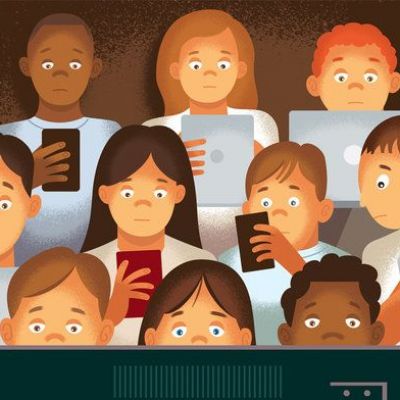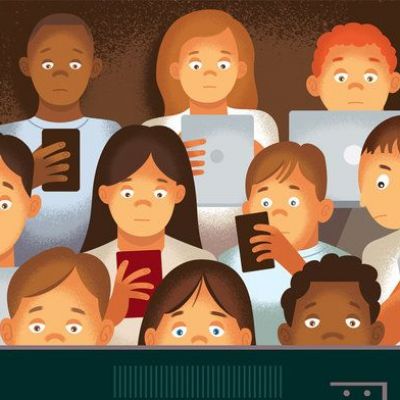

10 years ago
9
Screen Addiction Is Taking a Toll on Children
Excessive use of computer games among young people in China appears to be taking an alarming turn and may have particular relevance for American parents whose children spend many hours a day focused on electronic screens. The documentary “Web Junkie,” to be shown next Monday on PBS, highlights the tragic effects on teenagers who become hooked on video games, playing for dozens of hours at a time often without breaks to eat...
Continue Reading


























Join the Discussion
I used to think articles like this were mostly nonsense. However, since my daughter was born I've really been looking at this issue a lot differently. When I look back on my own relationship with video games, for example, I'm not so sure it's always been a healthy one.
What do I have to show for all the time I put into getting 100% on GTA3, GTA:VC, and GTA:SA? How much work did I blow off doing that, and how much further along could my career be? How much sooner could I have started my family if instead of playing video games I worked on improving myself? What does it mean when my wife tell me I'm more aggressive and easier to anger during the periods when I'm playing?
I'm 36 and I've played video games my entire life, yet I only recently got married and my kid is less than a year old. These are the questions that dominate my thoughts as I consider how to raise my daughter. We try to approach it the way we approach everything: with moderation. There's a few shows we let my daughter watch (creative galaxy, baby einstein puppets, curious george) but we try not to put her in front of it every day, and we don't do it too long at a time.
Hopefully the enjoyment achieved through having a goal and achieving it brings.
I'm hoping you're in a career you like, in which case it's at worst a comparison on which thing you'd more enjoy spending your time on, and at the time it seems the goals in game were more important than the goals you had at work. Neither are invalid goals to strive for and as long as you enjoyed your choice at the time it was probably the right one.
If, on the other hand you're only in it for the money (speaking career here), I suppose the only benchmark would be how much more time advancing it at a earlier stage would have brought to activities you enjoy now as opposed to going for the more direct enjoyment you received by focusing on other goals than your career at the time. If your career at this time leaves enough time to enjoy your family and hobbies, it would seem you've made good choices.
This might be me misremembering something I read, but I believe the point was that the competitive nature of some games (you didn't specify if this was during all gaming) might temporarily increase aggression while also acting as an outlet for it.
Possibly tangentially related, but it may also have to do with the whole "flow" thing. If I don't misremember the book with the same name, one aspect of flow was potentially a somewhat negative reaction to it getting interrupted. Possibly also a reason why people get road rage, as I believe driving was quite a common way of getting into the zone. But this is a more speculative statement on my part, can't remember reading any hard facts on the matter merely statements by others.
I think this is the key in life, not letting any one aspect consume you. There have been times in my life where video games have taken a significant amount of my time, but I don't regret those moments because they too were a part of the experience we call life and I did enjoy those times as they went along.
You bring up good points regarding enjoyment and achievement. Sometimes we make the choices we do because we think they'll bring us enjoyment. I think what I'm getting at is that satisfaction with one's life is not always achieved by doing those things that bring you the most enjoyment.
The funny thing about turning your passion into your career is that you may end up hating your job. If your career doesn't go where you want it to, and you can look back at specific choices you made to play video games instead of working, what at the time seemed like the right choice may not seem like the right choice after all. OTOH, it's possible that working instead of playing video games would have lead to burn-out.
This makes a lot of sense. I'm definitely not in a pleasant mood when my flow is interrupted, but I try very hard not to expose the person interrupting me to this.
True, this is something that's very hard to analyse in the moment & sometimes you have to go against your immediate feeling. As an example, my brother was recently renovating and occasionally asked for help. As I'm not one for manual labor, my first instinct is to deny the help, but I always accepted after a short internal conflict and didn't regret it once. Sure, the task at hand may not have been something I enjoy, but the satisfaction of being able to help someone close to me as well as seeing the progress made certainly helped make it maybe not a enjoyable memory but still a good one.
Yeah, this is a difficult problem made more difficult because one can't predict the outcome. Makes me feel like the right approach to seeking a career is to find something you like, but maybe not love. Though turning a passion into a career does come more naturally. Still, if one of the top five regrets of the dying is working too hard, I find it hard to justify a too great investment in one's career. Especially how one's relationship to the passion would seem to inevitably change due to the nature of it also being a means of income. Unless one is lucky enough to earn sufficient income to live comfortably to one's own standards by only making it work when one feels like it.
Yeah, it feels like a accurate hypothesis. But it's certainly something to be aware of & gives one the opportunity to recognise it and as you said, not channel that frustration on others.
A lot of this sounds like the same bogeyman arguments we've heard since the 90s about violence and video games, though I will begrudge that these people are probably more qualified to talk about it than I am. To me, though, this really isn't all that surprising. I remember reading a while back that preteens and teens are now far less likely to be hooked on drugs (other than marijuana, that is), alcohol, or cigarettes than even just a few decades ago, so I suppose we just simply traded those addictions for "screen addiction". Probably a better addiction than the others, at least.
The video games -> violence argument is hard to make, because it involves trying to find a causal relationship in the data. Identifying addictions, though, is fairly straightforward. It doesn't surprise me at all that kids are struggling with addiction to electronics. Our brains probably aren't built to handle so much instant gratification.
Instant gratification makes sense. It makes me wonder if that's why easier "casual" (I loathe the term, but still) games are more popular with younger kids while older kids and adults tend to go for more difficult games.
I can see this from the perspective of someone who grew up before all these things were mainstream. But, if I isolate my kid from the relevant technology to avoid this, will he end up growing up to be an outcast, unable to interact with a society that grew up texting and playing with their parents' iPads? As much as I want my kid to be smart, I want him to be successful. Maybe we need to figure what's the right balance, and what will be the right definition of "smart" 18 years in the future.
But, given how fast technology is advancing, who can tell that?
If you think about it, surfing a web forum or facebook is as productive as sitting on your couch watching TV. Many people have found themselves to be more productive if they hold off on social media until after lunch time. Some even go as far as not checking their work email before noon in order to focus on a work priority as a first priority.